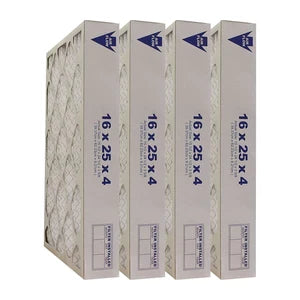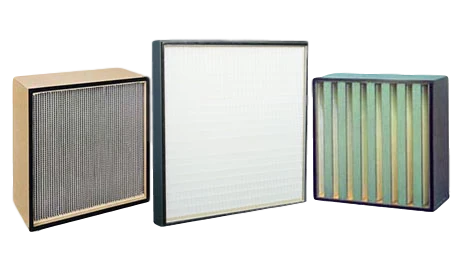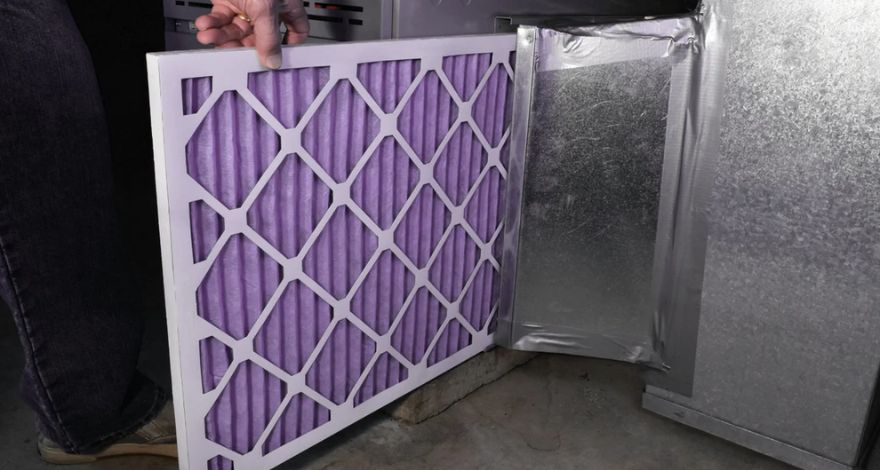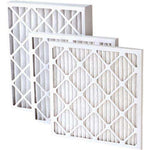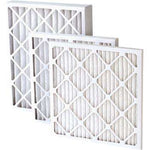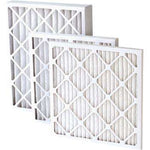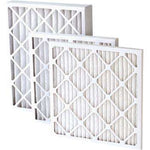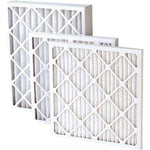You have no items in your shopping cart.
Is a Geothermal Air Filter Worth It? Homeowner Benefits, When to Replace, and More
Geothermal heating and cooling systems are a smart and greener way to keep your living environment comfortable year-round. But to keep them running smoothly over time, you need to choose quality air filters for geothermal systems.
A high-quality geothermal air filter can protect your HVAC, boost energy efficiency, and increase indoor air quality (IAQ) in your home.
If you're searching for these quality air filters for geothermal systems, we've got your back. This complete homeowner's guide features everything you must know about geothermal air filter replacement, the benefits of timely replacements, and much more.

How Do Geothermal Systems Work: Heating and Cooling?
A geothermal system uses the stable underground temperature of the earth to regulate the climate in your home. The systems rely on a heat pump and underground pipes that transfer heat between your property and the ground.
For example, in colder winter months, geothermal systems extract warmth from the earth to heat your home. In summer when the temperature gets hotter, they draw heat from your home and disperse it into the cooler ground.
When it comes to this setup, you should know about two filter types:
-
Air filters
-
Water filters
You can find air filters in the return ductwork of the geothermal HVAC system. These work just like standard HVAC filters: they clean the air before it gets conditioned and circulated throughout your home.
On the other hand, water filters are common in open-loop geothermal systems and they draw water directly from a pond or well. These filters remove particulates like iron, sand, and sediment that may damage system components.
What Is a Geothermal Filter and Why Do I Need One?
A geothermal air filter is an important component of a geothermal HVAC system: It helps keep everything working efficiently. Air filters for geothermal systems work by trapping different particles before they enter the air handling system.
This is especially important for people with allergies. A reliable geothermal air filter will trap tiny allergens like dust mites, pet dander, pollen, and mould spores, so the air you breathe is cleaner and safer.
If these particles get stuck, they can clog sensitive internal components like pumps and exchangers: This means potential costly repairs and decreased IAQ.
Since you're here reading this guide to geothermal filter replacement, you don't have to worry. Invest in quality options and stay on track with your geothermal filter replacement schedule.

The Most Common Sizes of Air Filters for Geothermal Systems
Air filters for geothermal systems come in different sizes. You can find standard or oversized options, with the most popular sizes being:
-
28x30x1 geothermal filter
-
28x30x2 geothermal filter
-
30x36x2 geothermal filter
These dimensions above represent the nominal size. The actual filter dimensions may slightly vary due to manufacturer-specific designs.
For example, a 28x30x1 geothermal filter might actually measure 27.5 x 29.5 x 0.75 inches. So, please double-check the filter's actual size before ordering a replacement.
If you don't know how to calculate the nominal and actual size of your filter, do this. Get a tape and check your existing filter's "true dimensions" in inches (length x width x depth). Then, measure it to the nearest 1/8 inch.
Round each actual measurement up to the nearest whole inch. You'll end up with the rounded size that you'll typically see when shopping for furnace filters.
An incorrect geothermal filter size can lead to a poor fit, compromised filtration, and air leakage. These can become major problems that may cost you a lot of time and money.
How to Choose the Right MERV Rating for Furnace Filters?
Now that you're aware of what a geothermal filter is and how it works, let's talk about MERV ratings and what they mean for improved IAQ.
The acronym "MERV" is short for Minimum Efficiency Reporting Value, and this is a rating that indicates your home filter's ability to capture particles in the air.
The higher the MERV rating, the better it is at trapping smaller particles. However, higher ratings can also possibly restrict airflow if you don't properly match them to your HVAC's capacity.
When talking about air filters for geothermal systems and MERV ratings, we recommend choosing between MERV 8, MERV 11, and MERV 13.
MERV 8 is a lower rating option, but it is suitable for general filtration needs. It's effective at capturing pollen, dust, and lint, and is recommended for pet-free homes.
MERV 11 offers increased filtration, and it can capture even finer particles like pet dander and smoke. If you have pets or mild allergies, consider MERV 11 furnace filters.
For the highest level of filtration, you may also consider MERV 13. It can trap some viruses, bacteria, and other fine particulate matter. If you or your family member are dealing with serious allergies or respiratory conditions, MERV 13 could be a good solution.
How Should I Clean a Geothermal Air Filter?
Most homeowners use disposable air filters for geothermal filters as they're easy to maintain and replace. As the name reveals, they aren't designed to be reused or cleaned.
A common mistake homeowners make is trying to clean disposable filters, but this only ends in damaged fibres and reduced HVAC system efficiency.
Instead, you can consider washable or reusable metal filters. To clean, gently rinse the old filter with water and let it dry completely before you place it back into the system.
Don't use harsh detergents and avoid scrubbing too hard, as this can also degrade the material of the filter. If you aren't sure how to clean a geothermal filter, contact our support team or refer to the system's manual.

Is It Time to Replace My Old Geothermal Air Filter?
When is the geothermal filter replacement due? Well, it depends on a few factors, like whether you have pets (and how many you have), family members with allergies, and the overall environment of your home.
If you have multiple pets, it's best to change the geothermal air filter frequently. On average, you should switch out the old filter for a new one every three to six months. Better yet, do it every one to three months.
The same goes for multiple people living under the same roof: More people equals more skin flakes, dust, and possible allergens.
What are some typical signs you should think about geothermal air filter replacement?
Well, if your allergies have been flaring up recently, you notice increased dust around vents, and the cooling or heating performance is not so good, it may be time for a replacement.
The Best Air Filters for Geothermal Systems: Why Homeowners Always Choose United Filter
Are you interested in the highest-quality air filters for geothermal systems? Reach out to United Filter, and we'll do our best to help you.
We offer high-performance, Canadian-made discount furnace filters that perform just as well as big-brand OEM options. But at a better value. Our filters are made with top-notch synthetic media and built to meet industry standards.
Ordering from United Filter is easy, too. We provide accurate sizing and customer support to help you find the right fit for your HVAC every time.
FAQ
What is a geothermal filter?
Air filters for geothermal systems trap dust, debris, and other particles floating in the air before they can circulate through your HVAC.
What different size options are available?
The filters come in various HVAC sizes or custom-size options. Popular options include getting a 28x30x2 or a 30x36x2 geothermal filter.
When should I think about geothermal filter replacement?
It's best to think about geothermal filter replacements at least two times per year. However, sometimes you need to replace the filter every one to three months, depending on the MERV rating, household conditions (number of pets and family members), and usage.
Are air filters for geothermal systems useful?
Yes, they are! Air filters for geothermal systems help preserve energy efficiency (so expect lower bills at the end of the month), extend the system's lifespan, and improve IAQ.
Will getting new air filters for geothermal systems help me with allergies?
Yes, especially if you invest in a filter with a higher MERV rating such as MERV 11. These can capture common allergens like dust mites, pet dander, pollen, and mould spores.
Where can I get a quality geothermal air filter?
You can find the highest-quality and most affordable furnace filters in Canada at United Filters. We carry different geothermal filter options, including typical sizes 30x32x2 and 30x36x2.

Time to Order a Quality Geothermal Air Filter: Contact United Filter
You can't expect your geothermal system to work like a dream if the filter is old and funky. Stay on top of geothermal filter replacement and invest in quality if you want increased IAQ, lower energy bills at the end of the month, and reduced chances of allergies.
Get your hands on the best air filters for geothermal systems.
Shop at United Filter, and discover furnace filters, commercial filters (including bag filters, rigid box filters, HEPA filters, and geothermal filters), as well as custom-size filter options. Get in touch by calling (905) 403-0160 or (844) 834-5837 toll-free. Order the best air filters for furnace now!
Is a Geothermal Air Filter Worth It? Homeowner Benefits, When to Replace, and More
Geothermal heating and cooling systems are a smart and greener way to keep your living environment comfortable year-round. But to keep them running smoothly over time, you need to choose quality air filters for geothermal systems.
A high-quality geothermal air filter can protect your HVAC, boost energy efficiency, and increase indoor air quality (IAQ) in your home.
If you're searching for these quality air filters for geothermal systems, we've got your back. This complete homeowner's guide features everything you must know about geothermal air filter replacement, the benefits of timely replacements, and much more.

How Do Geothermal Systems Work: Heating and Cooling?
A geothermal system uses the stable underground temperature of the earth to regulate the climate in your home. The systems rely on a heat pump and underground pipes that transfer heat between your property and the ground.
For example, in colder winter months, geothermal systems extract warmth from the earth to heat your home. In summer when the temperature gets hotter, they draw heat from your home and disperse it into the cooler ground.
When it comes to this setup, you should know about two filter types:
-
Air filters
-
Water filters
You can find air filters in the return ductwork of the geothermal HVAC system. These work just like standard HVAC filters: they clean the air before it gets conditioned and circulated throughout your home.
On the other hand, water filters are common in open-loop geothermal systems and they draw water directly from a pond or well. These filters remove particulates like iron, sand, and sediment that may damage system components.
What Is a Geothermal Filter and Why Do I Need One?
A geothermal air filter is an important component of a geothermal HVAC system: It helps keep everything working efficiently. Air filters for geothermal systems work by trapping different particles before they enter the air handling system.
This is especially important for people with allergies. A reliable geothermal air filter will trap tiny allergens like dust mites, pet dander, pollen, and mould spores, so the air you breathe is cleaner and safer.
If these particles get stuck, they can clog sensitive internal components like pumps and exchangers: This means potential costly repairs and decreased IAQ.
Since you're here reading this guide to geothermal filter replacement, you don't have to worry. Invest in quality options and stay on track with your geothermal filter replacement schedule.

The Most Common Sizes of Air Filters for Geothermal Systems
Air filters for geothermal systems come in different sizes. You can find standard or oversized options, with the most popular sizes being:
-
28x30x1 geothermal filter
-
28x30x2 geothermal filter
-
30x36x2 geothermal filter
These dimensions above represent the nominal size. The actual filter dimensions may slightly vary due to manufacturer-specific designs.
For example, a 28x30x1 geothermal filter might actually measure 27.5 x 29.5 x 0.75 inches. So, please double-check the filter's actual size before ordering a replacement.
If you don't know how to calculate the nominal and actual size of your filter, do this. Get a tape and check your existing filter's "true dimensions" in inches (length x width x depth). Then, measure it to the nearest 1/8 inch.
Round each actual measurement up to the nearest whole inch. You'll end up with the rounded size that you'll typically see when shopping for furnace filters.
An incorrect geothermal filter size can lead to a poor fit, compromised filtration, and air leakage. These can become major problems that may cost you a lot of time and money.
How to Choose the Right MERV Rating for Furnace Filters?
Now that you're aware of what a geothermal filter is and how it works, let's talk about MERV ratings and what they mean for improved IAQ.
The acronym "MERV" is short for Minimum Efficiency Reporting Value, and this is a rating that indicates your home filter's ability to capture particles in the air.
The higher the MERV rating, the better it is at trapping smaller particles. However, higher ratings can also possibly restrict airflow if you don't properly match them to your HVAC's capacity.
When talking about air filters for geothermal systems and MERV ratings, we recommend choosing between MERV 8, MERV 11, and MERV 13.
MERV 8 is a lower rating option, but it is suitable for general filtration needs. It's effective at capturing pollen, dust, and lint, and is recommended for pet-free homes.
MERV 11 offers increased filtration, and it can capture even finer particles like pet dander and smoke. If you have pets or mild allergies, consider MERV 11 furnace filters.
For the highest level of filtration, you may also consider MERV 13. It can trap some viruses, bacteria, and other fine particulate matter. If you or your family member are dealing with serious allergies or respiratory conditions, MERV 13 could be a good solution.
How Should I Clean a Geothermal Air Filter?
Most homeowners use disposable air filters for geothermal filters as they're easy to maintain and replace. As the name reveals, they aren't designed to be reused or cleaned.
A common mistake homeowners make is trying to clean disposable filters, but this only ends in damaged fibres and reduced HVAC system efficiency.
Instead, you can consider washable or reusable metal filters. To clean, gently rinse the old filter with water and let it dry completely before you place it back into the system.
Don't use harsh detergents and avoid scrubbing too hard, as this can also degrade the material of the filter. If you aren't sure how to clean a geothermal filter, contact our support team or refer to the system's manual.

Is It Time to Replace My Old Geothermal Air Filter?
When is the geothermal filter replacement due? Well, it depends on a few factors, like whether you have pets (and how many you have), family members with allergies, and the overall environment of your home.
If you have multiple pets, it's best to change the geothermal air filter frequently. On average, you should switch out the old filter for a new one every three to six months. Better yet, do it every one to three months.
The same goes for multiple people living under the same roof: More people equals more skin flakes, dust, and possible allergens.
What are some typical signs you should think about geothermal air filter replacement?
Well, if your allergies have been flaring up recently, you notice increased dust around vents, and the cooling or heating performance is not so good, it may be time for a replacement.
The Best Air Filters for Geothermal Systems: Why Homeowners Always Choose United Filter
Are you interested in the highest-quality air filters for geothermal systems? Reach out to United Filter, and we'll do our best to help you.
We offer high-performance, Canadian-made discount furnace filters that perform just as well as big-brand OEM options. But at a better value. Our filters are made with top-notch synthetic media and built to meet industry standards.
Ordering from United Filter is easy, too. We provide accurate sizing and customer support to help you find the right fit for your HVAC every time.
FAQ
What is a geothermal filter?
Air filters for geothermal systems trap dust, debris, and other particles floating in the air before they can circulate through your HVAC.
What different size options are available?
The filters come in various HVAC sizes or custom-size options. Popular options include getting a 28x30x2 or a 30x36x2 geothermal filter.
When should I think about geothermal filter replacement?
It's best to think about geothermal filter replacements at least two times per year. However, sometimes you need to replace the filter every one to three months, depending on the MERV rating, household conditions (number of pets and family members), and usage.
Are air filters for geothermal systems useful?
Yes, they are! Air filters for geothermal systems help preserve energy efficiency (so expect lower bills at the end of the month), extend the system's lifespan, and improve IAQ.
Will getting new air filters for geothermal systems help me with allergies?
Yes, especially if you invest in a filter with a higher MERV rating such as MERV 11. These can capture common allergens like dust mites, pet dander, pollen, and mould spores.
Where can I get a quality geothermal air filter?
You can find the highest-quality and most affordable furnace filters in Canada at United Filters. We carry different geothermal filter options, including typical sizes 30x32x2 and 30x36x2.

Time to Order a Quality Geothermal Air Filter: Contact United Filter
You can't expect your geothermal system to work like a dream if the filter is old and funky. Stay on top of geothermal filter replacement and invest in quality if you want increased IAQ, lower energy bills at the end of the month, and reduced chances of allergies.
Get your hands on the best air filters for geothermal systems.
Shop at United Filter, and discover furnace filters, commercial filters (including bag filters, rigid box filters, HEPA filters, and geothermal filters), as well as custom-size filter options. Get in touch by calling (905) 403-0160 or (844) 834-5837 toll-free. Order the best air filters for furnace now!
